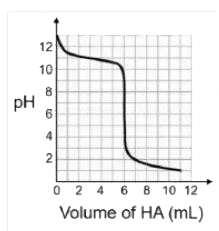If the pKb of a base is large, it is a strong base .
The correct Answer is:False
To determine whether a large pKb indicates a strong base, we need to understand the relationship between Kb, pKb, and the strength of a base.
1. Understanding Kb:
- The base dissociation constant (Kb) measures the strength of a base in solution. A larger Kb value indicates that the base dissociates more completely in water, producing more hydroxide ions (OH−).
- For a base BOH, the dissociation can be represented as:
BOH⇌B++OH−
- The expression for Kb is:
Kb=(B+)(OH−)(BOH)
2. Understanding pKb:
- The pKb is defined as:
pKb=−log(Kb)
- This means that pKb is inversely related to Kb. If Kb is large, pKb will be small, and vice versa.
3. Relationship Between Kb and Base Strength:
- A strong base will have a high Kb value, indicating that it dissociates significantly in solution.
- Consequently, a strong base will have a low pKb value.
4. Analyzing the Statement:
- The statement in the question claims that if pKb is large, it indicates a strong base. However, since a large pKb corresponds to a small Kb, this means that the base does not dissociate well in solution.
- Therefore, a large pKb actually indicates a weak base, not a strong one.
5. Conclusion:
- The statement "If the pKb of a base is large, it is a strong base" is false. A large pKb indicates a weak base.
- The base dissociation constant (Kb) measures the strength of a base in solution. A larger Kb value indicates that the base dissociates more completely in water, producing more hydroxide ions (OH−).
- For a base BOH, the dissociation can be represented as:
BOH⇌B++OH−
- The expression for Kb is:
Kb=(B+)(OH−)(BOH)
- The pKb is defined as:
pKb=−log(Kb)
- This means that pKb is inversely related to Kb. If Kb is large, pKb will be small, and vice versa.
- A strong base will have a high Kb value, indicating that it dissociates significantly in solution.
- Consequently, a strong base will have a low pKb value.
- The statement in the question claims that if pKb is large, it indicates a strong base. However, since a large pKb corresponds to a small Kb, this means that the base does not dissociate well in solution.
- Therefore, a large pKb actually indicates a weak base, not a strong one.
- The statement "If the pKb of a base is large, it is a strong base" is false. A large pKb indicates a weak base.
Topper's Solved these Questions
- EQUILIBRIUMBOOK - MODERN PUBLICATIONCHAPTER - EQUILIBRIUMEXERCISE - Revision Exercise (Fill in the blanks)
14 Videos
- EQUILIBRIUMBOOK - MODERN PUBLICATIONCHAPTER - EQUILIBRIUMEXERCISE - Revision Exercise (Assertion Reason )
15 Videos
- EQUILIBRIUMBOOK - MODERN PUBLICATIONCHAPTER - EQUILIBRIUMEXERCISE - Revision Exercise (Passage Based Questions)
10 Videos
- ENVIRONMENTAL POLLUTION BOOK - MODERN PUBLICATIONCHAPTER - ENVIRONMENTAL POLLUTION EXERCISE - UNIT PRACTICE TEST
15 Videos
- HALOALKANES AND HALOARENESBOOK - MODERN PUBLICATIONCHAPTER - HALOALKANES AND HALOARENESEXERCISE - UNIT PRACTICE TEST
12 Videos
Similar Questions
Knowledge Check
Which of the following is a strong base?
AAmmonium hydroxideBSodium hydroxideCMagnesium hydroxideDCopper hydroxideWhich of the following is a strong base?
APH3BAsH3CNH3DSbH3Which of the following is a strong base?
Acalcium hydroxideBsodium hydroxideCsodium carbonateDammonium hydroxide
Match Column -I with Column -II :
Column -I Column-II
(A) Ph of water ( p ) 12pKw
( B ) Ph of a salt of strong acid and strong base ( q) pH=12[pKw+pKa+logc]
(C ) Ph of a salt of weak acid and strong base ( r ) pH=12[pKw+pKa−pKb]
(D) Ph of a salt of weak acid and weak base (s) 7
where Ka,Kb are dissociation constants of weak acid and weak base and Kw= Ionic product of water.
View SolutionA solution of 0 .1 weak base (B )is titrated with 0.1 M of a strong acid ( HA) . The variation of pH of the solution will be the volume of HA added is shown in the figure below. What is the pKb of the base ? The neutralization reaction is given by B+HA→HA→BH++A−

View SolutionThe pKapKb values of some bases are as follows. Which is strongest base ?
View SolutionWhich of the following is strong base
View SolutionThe pKa of a weak acid, HA is 4.80. The pKb of a weak base BOH is 4.78. The pH of an aqueous solution of the corresponding salt, BA wil be
View Solution
